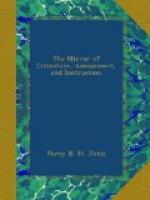“I am but a Gatherer and disposer of other men’s stuff.”—Wotton
* * * * *
NEGRO PUN.
At the late fancy ball in Liverpool, a gentleman who had assumed the swarthy hue of a “nigger,” was requested to favour the company with Matthews’s song—“Possum up a gum tree.”—“Non possum,” replied the wit.
* * * * *
“SPIRITS” OF THE MAGAZINES.
Is it not diverting to see a periodical supported, not by the spirits of the age, but by the small beers, with now and then a few ales and porters? Yet we doubt not that one and all of the people employed about the concern may be, in their way, very respectable schoolmasters, who, in small villages, cannot support themselves entirely on their own bottoms,—ushers in metropolitan academies, whose annual salary rarely exceeds twenty pounds, with some board, and a little washing—third-rate actors on the boards of the Surrey or Adelphi, who have generally a literary turn—a player on the hautboy in some orchestra or other—unfortunate men of talent in the King’s Bench—a precocious boy or two in Christ’s hospital—an occasional apprentice run away from the row, and most probably cousin of Tims.
Blackwood’s Mag.
After this specimen of “Contributors” who would be an Editor? It is a fair sample of more than one “paralytic periodical:” our readers must bear in mind a certain point of etiquette about “present company.”
* * * * *
FRAMEWORK OF SOCIETY.
“It is curious,” says the London Magazine, “to imagine what the society of New South Wales may be two thousand years hence. The ancestors of a portion of our proud nobility were thieves of one kind, the chieftain of ruder times being often nothing better than a well-established robber. And why may not the descendants of another kind of thieves glory equally in their origin at some distant day, and proudly trace themselves to a Soames and a Filch, and dwell with romantic glow, on their larcenous deeds? A descendant of Soames may have as much pride in recalling the deeds of that distinguished felon in the Strand, as a descendant of a border chief has in recounting his ancestors levies of blackmail.”—Pope might well say—
“What can ennoble sots, or fools,
or cowards,
Alas! not all the blood of all the Howards”
* * * * *
SEEING IS BELIEVING.
In South America, the whole population is equestrian. No man goes to visit his next door neighbour on foot; and even the beggars in the street ask alms on horseback. A French traveller being solicited for charity by one of these mounted petitioners, at Buenos Ayres, makes the following entry in his note-book.—“16th November. Saw a beggar this morning, who asked alms of me, mounted on a tall grey horse. The English have a proverb, that says—’Set a beggar on horseback, and he’ll ride to the devil!’ I had often heard this mentioned, but never saw one upon his way before.”




